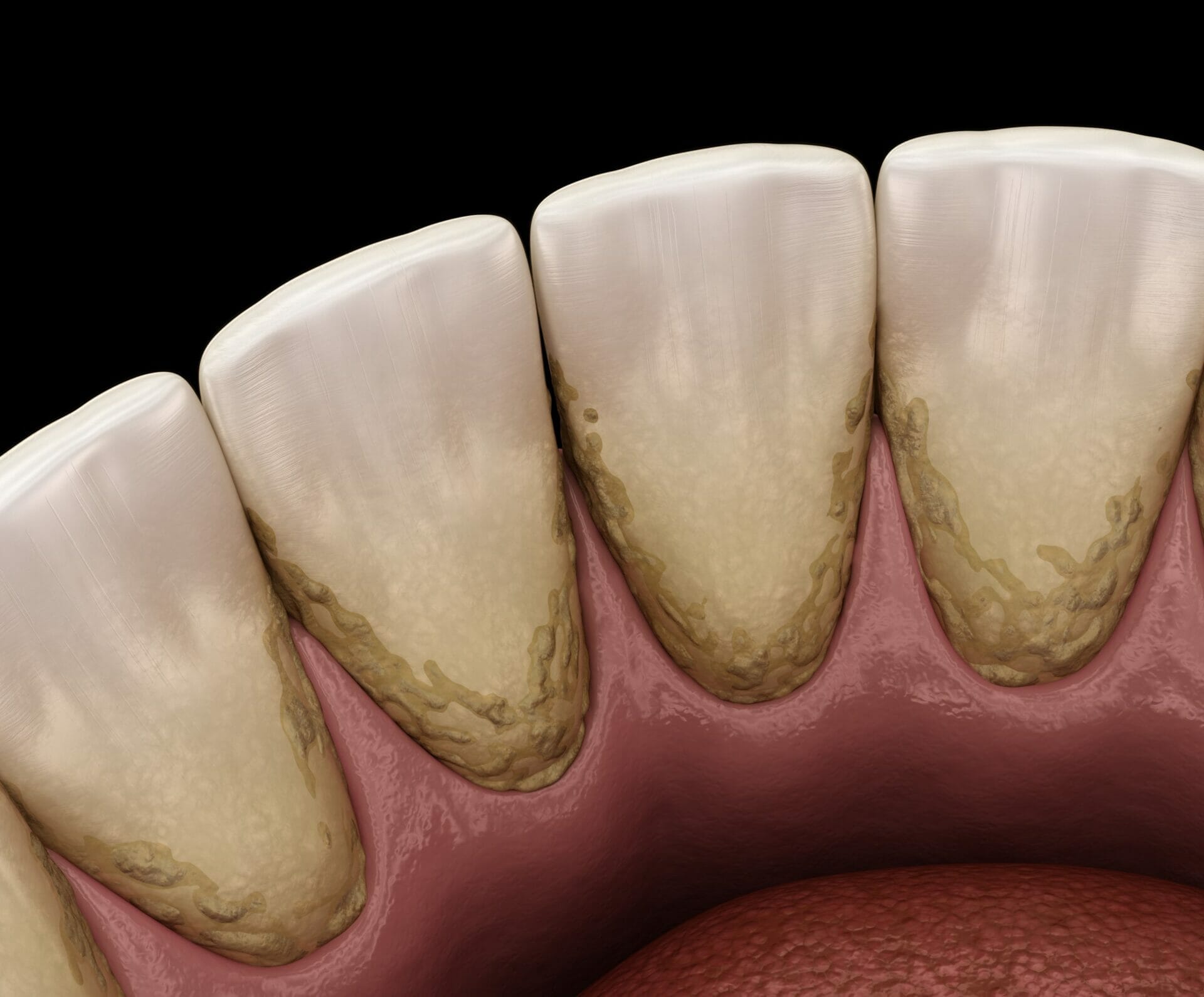
"Why do I get so much tartar on my bottom teeth?". Tartar drives patients nuts because it makes their teeth feel rough and it can cause inflammation and bleeding gums. As a Kitchener Dentist, I get a lot of questions about how to best control tartar. So, first, let's discuss what tartar is and its composition.
Tartar is simply calcified or hardened plaque. Plaque is made up for dissolved food residue. Calcium and phosphate in your saliva then soaks into plaque and hardens it. This tartar also contains bacteria which can fuel gum inflammation.
While you can brush plaque off of your teeth, you cannot do the same with tartar. When you have a professional dental cleaning at your Dentist's office, the Dental Hygienist uses tools designed to remove that tartar. This allows your gums to heal.
Why do we get tartar on our teeth?
People can build really thick block of tartar on their lower front teeth but very little elsewhere in the mouth.
So, what's the deal?
Well, you have lots of salivary output ducts under your tongue and the calcium and phosphate that mineralizes tartar comes from saliva.
So, that pool of saliva under your tongue is constantly bathing plaque around the gum lines of your lower front teeth.
This is why you build up tartar far more quickly at these sites compared to other area in the mouth!

If you take away a key ingredient in tartar formation you'll really slow its accumulation. It's tough to remove plaque as it accumulates because that would involve brushing and flossing after every instance of food intake. That's just plain hard to do!
But, we can focus on more realistic goals that will help minimize tartar in a big way. If you fail to brush thoroughly before bedtime, you are leaving plaque on your teeth for an 8-10 hour mineralizing cycle (this can lead to cavities and the need for costly dental treatment like dental fillings, dental crowns or even root canal treatment). Also, the plaque will cover areas of tooth enamel and prevent salivary minerals from diffusing into your teeth. This will impede mineralization and strengthening of your teeth as you sleep. You'd certainly rather strengthen your teeth than mineralize your plaque to form tartar!
So, make sure you brush for 2-3 minutes before bed. And, focus on the gum lines with a soft, light-pressure technique. The reason? Most tartar builds around the gum lines.
In addition, regular dental cleanings will prevent long-term accumulation of bulky tartar deposits.
Lastly, you may choose to add brushing and flossing after lunch to your routine. This will also help to decrease daily plaque accumulation and eventual tartar formation!
Thanks for reading today!
Alright, so I wanted to get our readers some more helpful information about teeth and tartar. Here are some commonly asked questions about tooth tartar!
Tartar is bad for both teeth and gums.
The reason?
Well, tartar is a broad mixture of things but 2 of those things are plaque and harmful bacteria. Live bacteria form on the outer layers of tartar and the tartar itself provides a fuel source.
Add to that the fact that tartar keeps bacteria and other contaminants pressed against your gums and teeth, and you can see why stagnant tartar is a recipe for developing tooth decay and gum disease.

Well, maybe we shouldn't "go there" with this question. Most things that dissolve tartar will do so by breaking down mineral content. These tartar-fighters could also demineralize your enamel.
Strong citrus acids can dissolve tartar but they kind of beat up on your tooth enamel, too.
Some mouthwash formulations contain anti-tartar ingredients. You need to be mindful of all the ingredients in your mouthwash however, because many can dry your mouth or harm the friendly and beneficial varieties of bacteria we all carry in our mouths.
The best way to have tartar removed is using dental instruments like scalers and curettes. These are the instruments your Dental Hygienist in Kitchener uses at your routine cleaning appointments.
Give us a call at (519) 576-8160 or request a consult here.
Our Kitchener Dental Clinic is conveniently located in Downtown Kitchener and we are a short drive away for families in Waterloo, Breslau & St. Jacobs. Our central location means we truly offer family dentistry near you!
This article is meant to promote understanding of and knowledge about general oral health topics. It is not intended to be a substitute for professional advice, diagnosis or treatment. Accordingly, always seek the advice of your Kitchener Dentist or other healthcare provider regarding a dental condition or treatment.
Services
Routine Dentistry & Tooth Repair
Oral Surgery & Tooth Removal
Prosthetic Dentistry & Tooth Replacement
Protective/Preventive Services
Teeth Whitening
Schedule an Appointment Now
